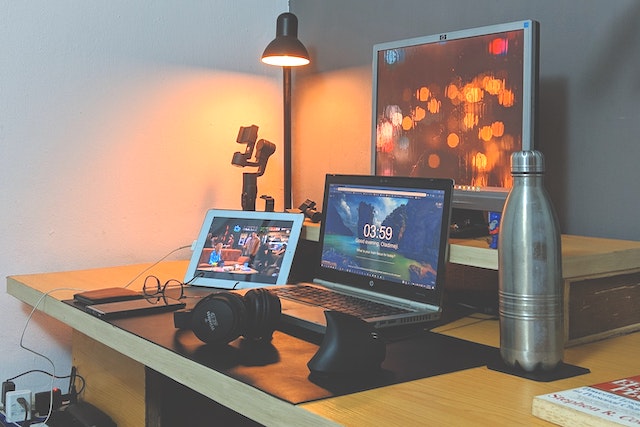When Bill Gates said in the 80’s that his goal was “a computer on every desk and in every home” he may not have realized how prescient that would be. Fast forward to 2020, when the average U.S. home had approximately 10 connected devices. Think about that—computers, smartphones, tablets, e-readers, smart TVs, digital cameras, game consoles, smart watches, smart home hubs, etc. The list is endless when you add in the potential for smart light switches, garage door openers, speakers, virtual reality devices, GoPros, and wearable technology. Most of us love gadgets–technology has definitely made some parts of life so much easier. But don’t let your tech become your clutter problem. Here are some tips and tricks to keeping your devices organized and accounted for.
Pare Down What You’ve Got
Set aside an hour or two, and have everyone in your household bring out all their tech, plus all related manuals, chargers, cords, etc. Go through your cabinets and “junk” drawers, desk drawers, car consoles, and any other storage places where you’ve kept electronics items. Don’t forget old flash drives and SD cards. Bring it all out! Set aside the items you truly use, along with its chargers/cords/manuals. The rest, put in a discard pile. Anything that no longer works or is missing chargers or plugs? Discard pile.
Say Bye to the Originals
Single-use devices, such as an MP3 player or digital camera, are pretty outdated now. These can go in the discard pile. If you have older versions of newer items, these should go, too. Because really, why would you keep your devices from one or two versions ago, when you’ve got the updated version? If you’ve got an older console and games collecting dust, your local Facebook or NextDoor group is a wonderful place to donate them; trust me, they will be snapped up by a very happy family!
Dispose of Electronics Safely
Your tech should not just be put in a box and donated to Goodwill or your church—most of our devices contain personal data, whether it’s photos, names and addresses, emails, gamer account IDs, or credit card numbers. Dispose of your devices safely, at reputable places where they recycle what materials they can while also making sure your data is properly and completely erased. We like InterConnection in Seattle; they also provide a list of electronic recyclers. Always call first to check e-recyclers’ current schedules and protocols.
Set Up Charging Stations
If you have multiples of one device, such as a smartphone, set up a central station for charging them. The kitchen is usually an optimal point, so pick a dedicated outlet and use a multi-plug wall charger. If you’ve got several devices to charge in one spot, such as your home office or nightstand, consider changing out one of your regular outlets to one with both electrical and USB ports. Instead of stacking devices, try a device organizer or an old divided magazine organizer.
Tame the Cords
Cords behind the TV, going into the chargers, or flowing down behind your home office desk—can you name which cord goes to what? Tame those cords-gone-wild with cord organizers and labels. If you ever need to unplug one device, you’ll know exactly which cord to pull!
Up Your Game
If you’ve got kiddos (or adults!) with a serious collection of gaming devices, organize these so things are easy to find and items are grouped together properly. For instance, if you’ve got both Wii and PlayStation consoles, group the games, controllers, cords, and other game items together by console type. Use that label maker so the items don’t get mixed up. The gamers in your life will thank you!
Take Inventory
Now that you’ve got your tech pared down and organized, it’s the perfect time to take inventory. Set up a spreadsheet and enter in your items by type, brand, model, and software version—bonus points if you enter serial numbers and date of purchase. Update it each time you upgrade, which is likely every one to two years. This is a fantastic way to keep track of your devices.
I remember what a big deal it was when my family got its first home computer, a Macintosh SE with a 20MB hard drive that my father thought was “a crazy amount of storage that no one will ever use”. That was so easy to keep track of because we had one device, a stack of 3.5″ floppy disks, and a few games (Zork, anyone?). We’ll only be accumulating more devices, so why not embrace it and organize it all while you can!

